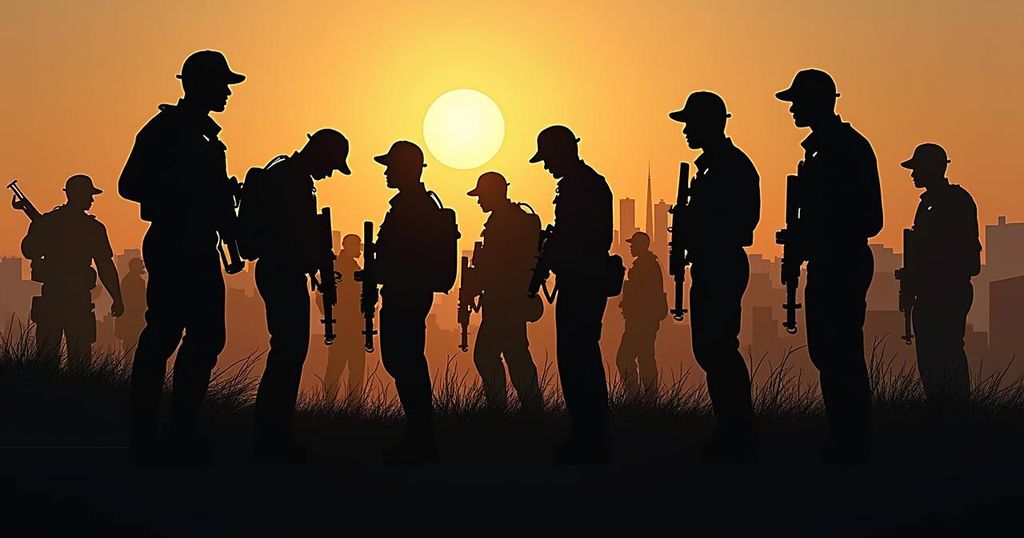Nayib Bukele Defends Anti-Gang Campaign at UN Assembly

President Nayib Bukele of El Salvador defended his government’s anti-gang measures at the UN, claiming they have restored safety and human rights. He reported that 82,000 alleged gang members were arrested since March 2022 and argued that the nation transitioned from extreme violence to becoming a safer environment. However, these methods have drawn criticism from human rights groups, raising concerns over the detention of innocents and prison conditions. Bukele asserted that freedom of expression is still protected under his administration, distinguishing it from repressive tactics.
In a recent address at the United Nations General Assembly, President Nayib Bukele of El Salvador presented a robust defense of his government’s anti-gang initiatives, asserting that they have significantly improved public safety in the nation. “In the last five years, El Salvador was reborn, we returned the streets of our country to our people,” Bukele declared during his speech. These efforts began with a declaration of a state of emergency in March 2022, granting authorities the ability to detain individuals without a court warrant, resulting in the arrest of approximately 82,000 individuals alleged to be associated with gangs. Bukele asserted, “Some say that we have imprisoned thousands, but the reality is that we have freed millions. Now it’s the good people who live freely, without fear, with their freedoms and human rights fully respected.” The president emphasized the dramatic transformation of El Salvador’s reputation from one of the most violent countries globally, often referred to as the murder capital of the world, to a safer environment, claiming, “We turned our nation, once the murder capital of the world, into the safest country in the entire Western Hemisphere. It was the greatest challenge our nation has ever overcome.” Despite the positive claims by the administration, human rights organizations have voiced serious concerns regarding the methods employed in this crackdown, indicating that many innocent individuals may also have been caught in the net of arrests and criticizing the conditions within prisons. Bukele addressed such criticisms by articulating that El Salvador has seen both a resurgence in safety and a revitalization of its economy, particularly through tourism. He highlighted efforts to create a conducive atmosphere for tourists and to welcome back Salvadorans who previously fled the country due to violence and poverty. Furthermore, President Bukele affirmed the protection of political and freedom of expression rights within El Salvador. “In El Salvador, we don’t imprison our opposition, we don’t censor opinions, we don’t confiscate the assets of those who think differently, we don’t arrest people for expressing their ideas,” he proclaimed, underlining the government’s commitment to safeguarding individual rights. Bukele concluded by affirming, “In El Salvador, your freedom of expression, as well as your private property, will always be protected.” This speech presents a dichotomy wherein the government’s pursuit of public safety through aggressive measures faces severe scrutiny from various human rights advocates, thus igniting a broader discourse on the balance between security and individual rights.
In recent years, El Salvador has grappled with rampant gang violence, primarily attributed to notorious groups known as “maras,” which have a significant impact on public life and safety. The government, led by President Nayib Bukele, launched a comprehensive strategy aimed at eradicating gang influence to restore peace and order throughout the nation. This strategy, however, has attracted controversy, particularly regarding human rights issues and the impact on innocent civilians amidst widespread arrests. Bukele’s administration claims that public safety has drastically improved, leading to economic revitalization, while critics question the means and potential consequences of these policies.
In summary, President Nayib Bukele’s speech at the UN reflects his administration’s claims of successfully restoring security and order in El Salvador through robust anti-gang measures. While he asserts significant improvements in safety and economic stability, contrasting criticisms regarding human rights abuses underscore the complexities surrounding these initiatives. The ongoing discourse highlights a critical examination of the balance between enforcing law and protecting individual rights within the country.
Original Source: ticotimes.net







